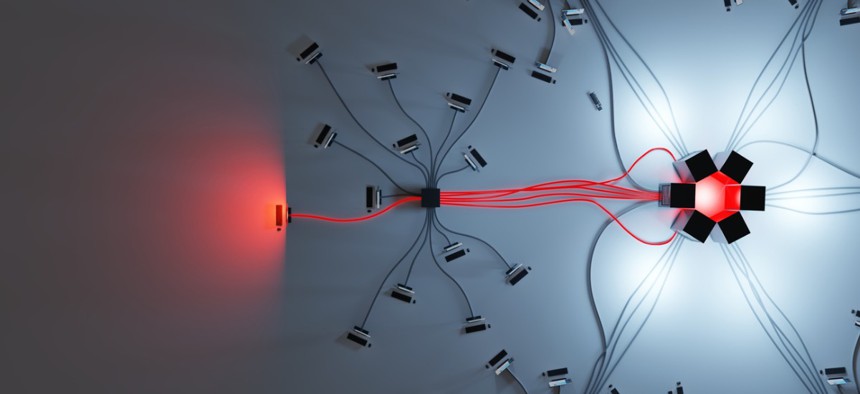DOE Watchdog Detailed Its Cybersecurity State Amid SolarWinds Hack

hernan4429/iStock.com
The department continues to struggle with many of the issues the Cybersecurity and Infrastructure Security Agency identified after widespread intrusions into the public and private sector.
Recommendations the Energy Department’s Inspector General made for improving information security align with the focus of the Cybersecurity and Infrastructure Security Agency following a massive hacking campaign that leveraged software from government-contracted network management company SolarWinds.
The DOE IG report out March 25 in accordance with the Federal Information Security Modernization Act covers the period from March 2020—right after hackers deployed the malware—to January 2021, just after initial breaches were reported. The IG’s office didn’t draw any conclusions based on the timing but said it would track potential impacts from the event.
“Subsequent to our test work, it was reported that Federal agencies, including the Department and the National Nuclear Security Administration, encountered a serious and sophisticated cybersecurity attack,” the report reads. “Due to the timing of our review, we did not evaluate the circumstances surrounding any potential impact to the Department or the National Nuclear Security Administration, or how such an attack could have impacted our results, if at all. We will continue to follow developments related to any potential impact as we continue our future test work.”
But the report’s findings and recommendations echoed many of the pitfalls highlighted by the Cybersecurity and Infrastructure Security Agency in alerts and directives following the SolarWinds hack and subsequent breaches of on-premises servers for Microsoft Exchange.
The possibility of the National Nuclear Security Administration being among the list of impacted entities alarmed many due to its role in managing the nation’s stockpile of nuclear weapons. The IG’s report does not name specific locations where it identified issues but noted that the report was based on 28 department locations under the purview of the NNSA, the Under Secretary for Science and Energy, the Energy Information Administration, and certain staff offices.
In all, the IG’s office made 83 recommendations regarding access controls, the management of configurations and vulnerabilities and the system integrity of web applications. And while the report noted that the department closed 78% of the prior year’s recommendations, many of the new ones were addressing the same, persistently problematic areas.
“Our review at 28 locations during FY 2020 revealed that most identified weaknesses were similar in type to those identified during prior evaluations,” the IG wrote. And those will sound familiar to anyone reading recent documents from CISA.
For example, CISA noted that the same hackers who used a trojanized SolarWinds update to gain unauthorized access into networks also took advantage of rudimentary ways to get past weak passwords, something DOE locations continue to grapple with according to the report.
“One site had not fully implemented its plan for managing passwords, and user profiles were not in compliance with defined password requirements,” the IG wrote. “During our prior year review, the same location had a similar finding, and corrective actions had not been fully implemented at the time of our current review. Another site had not appropriately implemented password requirements and session lock settings dictated by applicable policies and procedures.”
The department needed to do a better job, in general, with managing its access controls. And they’re not the only ones, according to CISA, which on Wednesday listed reviewing and restricting user privileges under an emergency directive specific to on-premises Microsoft Exchange servers.
CISA’s emergency directive also orders agencies to properly configure firewalls. In DOE's case, failure to do this could have led to unauthorized access to the supervisory control and data acquisition, or SCADA, system, which controls the operational technology of physical components like pressure valves and actuators.
“Multiple firewalls had rules that could have permitted any system in the ‘Users’ enclave to access the Supervisory Control and Data Acquisition (SCADA) system and related devices through at least one unsecure protocol,” the report said. “During testing, we determined that firewalls did not properly restrict access to 50 SCADA or SCADA-related devices over this unsecured protocol.”
CISA also ordered agencies to only run Microsoft Exchange on operating systems that were supported by the vendor. At the DOE, “six locations reviewed were running unsupported software on network servers and/or workstations. In particular, we identified workstation and server operating systems that were no longer supported, including Red Hat Linux, Mac OS X, and Windows Server 2008, at various sites,” the IG said. “For instance, our limited testing at one location found critical- and high-risk vulnerabilities related to unsupported software on 6 of 15 (40 percent) servers tested.”
Under a binding operational directive finalized last year, CISA now requires agencies to report on their management of vulnerabilities, a major issue for DOE, according to the report.
“At one location, we determined that there were 12,256 high-risk vulnerabilities related to missing security patches or software no longer supported by the vendor on at least 145 of the 365 workstations included in our sample at that location,” the IG said, noting, “Because our testing only included a sample of workstations and servers, it is likely that the locations reviewed had many more vulnerabilities than our test results demonstrated.”
The IG also noted problems in other areas, such as improper or absent training and contingency planning, and auditing and accountability measures such as implementing sufficient logging capabilities.
In addition to gaining control of physical processes, attackers could also exploit the weaknesses identified to access sensitive financial information and otherwise cause harm, according to the report. The DOE agreed with the IG’s recommendations.






